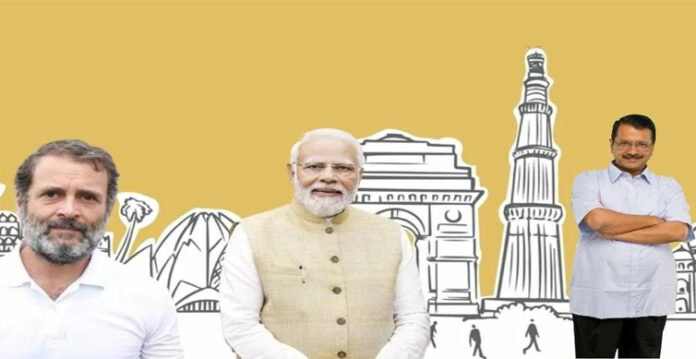Delhi is set to cast its vote today in the highly anticipated 2025 Delhi Assembly elections, with the results expected on February 8. The political atmosphere in the national capital is electric, as 1.56 crore voters head to the polls to choose representatives across 70 constituencies. With high stakes and intense political competition, the election is shaping up to be a pivotal moment in the city’s political landscape.
The ruling Aam Aadmi Party (AAP), led by Arvind Kejriwal, is seeking a third consecutive term in office, while the Bharatiya Janata Party (BJP) and Congress are both aiming to reclaim power and relevance in Delhi. The month-long campaign has been marked by intense rhetoric, with each party launching sharp personal attacks. BJP leaders accused AAP of corruption, branding their governance as an ‘AAP-da’ (disaster). In retaliation, Kejriwal took aim at the BJP, alleging failures in law and order, and even accusing the BJP-led Haryana government of mixing poison in the Yamuna, which he called an attempt at ‘genocide.’
Congress, on its part, has targeted both the AAP and BJP, accusing them of corruption and inefficiency. With voters’ attention firmly on the election, the parties have rolled out a series of promises aimed at winning over the electorate. AAP has pledged monthly payments to temple priests, free bus rides, and various schemes for the youth and students. Meanwhile, both BJP and Congress have promised subsidized cooking gas cylinders and financial support for women and unemployed youth. The BJP also promised Rs 21,000 for expecting mothers, while Congress offered Rs 8,500 per month for unemployed youth.
Also Read: Students Weigh In: Delhi’s Political Future and the Battle Between AAP and BJP
As the elections take place, security measures are stringent. Over 30,000 police personnel and 220 paramilitary companies have been deployed across the city. More than 3,000 polling booths have been identified as sensitive, ensuring voter safety and a smooth electoral process.
Though assembly elections are typically state-level affairs, the fact that these elections are being held in Delhi—India’s national capital—adds national significance to the outcome. A victory for AAP could further solidify Kejriwal’s model of governance, presenting it as a potential template for other states and strengthening AAP’s claims in national politics. On the other hand, a BJP victory could signal a resurgence of the party in urban governance and reinforce Prime Minister Modi’s narrative of efficient governance.
For Congress, a strong showing in the election could be a much-needed revival after a series of setbacks. The results will not only shape the immediate future of Delhi but could also have a profound impact on the national political discourse.
However, while the Delhi election is of national importance, it may not serve as a perfect model for other states. Delhi’s unique status, blending local and national issues, creates an electoral environment unlike that of other states. Additionally, the high-pitched rhetoric and personality-driven politics in Delhi tend to overshadow substantive policy debates, making the Delhi election more of an exception than a benchmark for other states to follow.
As voters head to the polls, the outcome of these elections will undoubtedly influence the political climate, both in Delhi and across the country, shaping the future course of governance in India’s national capital.
(This story is sourced from a third-party syndicated feed. Raavi Media takes no responsibility or liability of any nature. Raavi Media management/ythisnews.com can alter or delete the content without notice for any reason.)


